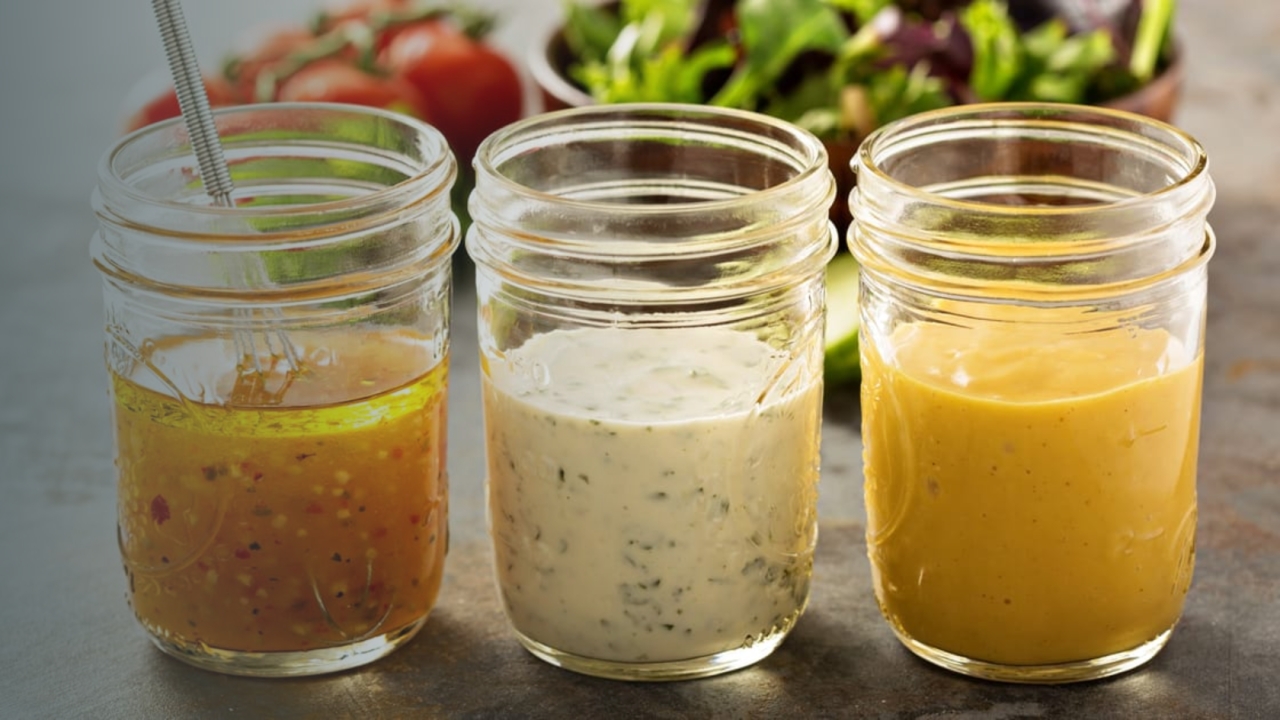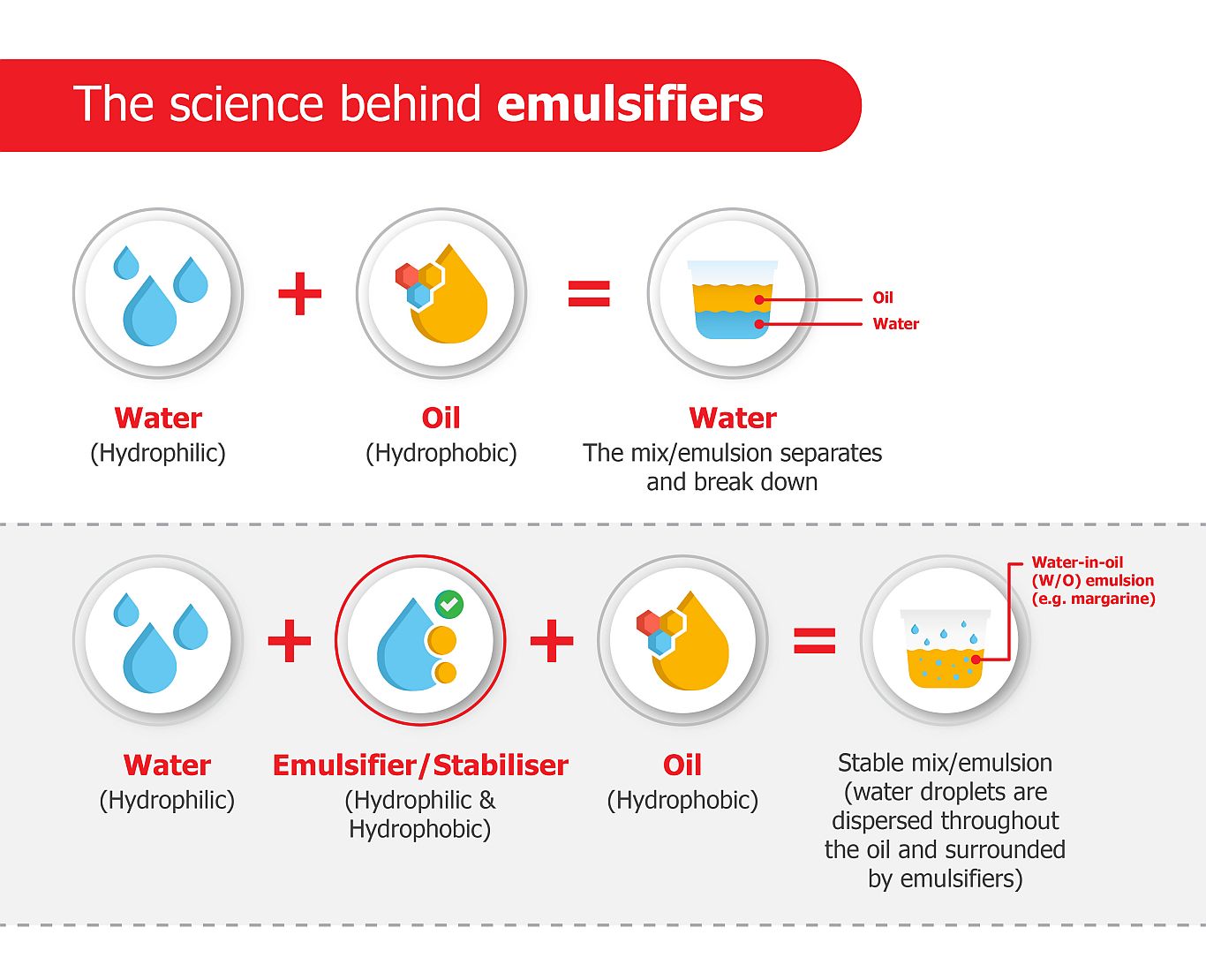The Scientific research Behind Emulsifiers and Their Relevance in Modern Production
Emulsifiers play an important role in modern-day manufacturing, acting as the unhonored heroes that blend oil and water for a wide array of products. As customer preferences change towards cleaner tags, the demand for cutting-edge emulsifiers is growing.
What Are Emulsifiers?
Emulsifiers are vital representatives worldwide of food and item manufacturing, acting as the adhesive that binds two or else immiscible liquids, like oil and water. You could not realize it, yet these compounds play an essential role in developing stable combinations. They minimize the surface tension in between these liquids, enabling them to mix perfectly. Usual examples include lecithin located in egg yolks and soybeans, and mono- and diglycerides used in numerous processed foods.

When you whip up a salad dressing or delight in a luscious dessert, emulsifiers assist preserve that excellent structure. They assure your items have a consistent mouthfeel and look, improving your total experience. Without emulsifiers, many foods would separate, resulting in unfavorable appearances and tastes. Following time you enjoy a smooth sauce or spread, remember the unsung heroes-- emulsifiers-- that make it all possible.
The Chemistry of Emulsification
When you blend oil and water, you may discover they do not mix quickly; that's where the chemistry of emulsification comes into play. To conquer this obstacle, emulsifiers are utilized.
When you add an emulsifier, its particles position themselves at the oil-water user interface, decreasing surface area tension and permitting the droplets to blend. The emulsifier forms a protective layer around each droplet, preventing them from coalescing back into different layers.
Kinds of Emulsifiers
Various types of emulsifiers play important roles in stabilizing mixes of oil and water. All-natural emulsifiers, like lecithin from egg yolks or soy, are derived from plants and animals, making them preferred in food products.
On the various other hand, synthetic emulsifiers, such as mono- and diglycerides, are chemically crafted to boost security and service life. They're commonly utilized in processed foods and cosmetic items.
Furthermore, you might find non-ionic, anionic, and cationic emulsifiers, each with distinct buildings that impact their performance. Non-ionic emulsifiers, for instance, work well in a large range of pH levels, while anionic emulsifiers have a tendency to do far better in alkaline conditions. Comprehending these types can aid you pick the ideal emulsifier for your certain application.
Mechanisms of Emulsion Development
Understanding exactly how emulsions create is important for creating steady mixtures of oil and water. When you introduce an emulsifier, it reduces the surface tension in between the two fluids, enabling them to blend more easily.
The emulsifier particles have a hydrophilic (water-attracting) head and a hydrophobic (oil-attracting) tail. When you include an emulsifier, these particles arrange themselves at the oil-water user interface. The hydrophilic heads interact with water, while the hydrophobic tails secure into the oil. This creates an obstacle that stabilizes the droplets, stopping them from coalescing.
Applications of Emulsifiers in Different Industries
Emulsifiers play an important role across different markets, making your favored foods smoother and much more enjoyable. In cosmetics, they improve product texture and security, ensuring a pleasurable application experience. And also, in drugs, they aid supply crucial components efficiently, boosting total efficacy.
Food Market Uses
While you could not understand it, emulsifiers play a vital function in the food sector, enhancing the appearance, stability, and service life of several items (Emulsifiers). They're typically located in salad dressings, sauces, and mayonnaise, helping to mix oil and water for a smooth, constant product. In baked items, emulsifiers boost dough handling and preserve moisture, leading to a much better internet texture and extended freshness. They're additionally crucial in milk items, where they support emulsions in lotions and ice creams, stopping splitting up. Also in treats, emulsifiers assist preserve crunchiness and stop stale tastes. By ensuring uniformity and high quality, emulsifiers are significant to delivering the delicious products you delight in daily, making them an essential ingredient in contemporary food production.
Aesthetic Formulas Advantages
When it pertains to cosmetic formulations, emulsifiers are important for developing items that really feel lavish and perform properly. They help blend oil and water, ensuring a smooth and stable uniformity in lotions, creams, and lotions. You'll discover that emulsifiers improve product security, stopping separation and prolonging life span. This suggests you can enjoy your favored cream without stressing over it going poor also promptly. Furthermore, emulsifiers improve the application experience, permitting for even distribution and much better absorption into the skin. By making use of emulsifiers, you also accomplish an even more enticing texture, making your cosmetics feel fascinating on your skin. Generally, emulsifiers play a vital duty in providing high-quality cosmetic products that satisfy your appeal demands.
Pharmaceutical Applications Summary
In the pharmaceutical market, emulsifiers are essential for creating look at these guys efficient medications. They assist develop secure blends of oil and water, making sure that active ingredients are uniformly dispersed and conveniently soaked up by the body. You'll find emulsifiers in different dosage types, like lotions, ointments, and fluid suspensions, boosting the bioavailability of medicines. They additionally enhance the texture and stability of products, making them a lot more enticing and simpler to use.
The Impact of Emulsifiers on Item Quality

By making certain stable solutions, you decrease the threat of wasting and expand shelf life, ultimately saving you time and cash. You'll also find that emulsifiers can improve the bioavailability of energetic ingredients in your products, making them more reliable for consumers.
In addition, they enable you to produce cutting-edge solutions that satisfy diverse customer demands. Whether you're crafting a velvety clothing or an extravagant cream, emulsifiers are vital for achieving the preferred outcomes. Basically, by comprehending and leveraging the influence of emulsifiers, you can considerably elevate the quality of your products.
Future Patterns in Emulsifier Advancement
As the need for cleaner labels and lasting products rises, the development of new emulsifiers is readied to develop significantly. You'll notice a change in the direction of plant-based and all-natural emulsifiers, driven by consumer preferences for components that are eco friendly and much less refined. Developments in biotechnology will likely enhance the functionality and performance of these emulsifiers, enabling suppliers to develop steady formulations with less additives.
You could likewise see a boost in multifunctional emulsifiers that not just stabilize emulsions however likewise improve taste, appearance, or dietary worth. This pattern can streamline active ingredient lists while improving item performance.
Furthermore, with developments in nanotechnology, emulsifiers could be engineered at the molecular level to attain extraordinary security and effectiveness. Emulsifiers. As you explore these trends, you'll locate that the future of emulsifier growth is not almost functionality, however likewise concerning accepting sustainability and transparency in ingredients
Often Asked Concerns
Are Emulsifiers Safe for Usage in Food Products?
Yes, emulsifiers are typically safe for usage in food items. They've been thoroughly researched and authorized by food safety and security authorities, so you can appreciate your favored foods without fretting about their effect on your wellness.
Can Emulsifiers Be Derived From Natural Sources?
Yes, you can obtain emulsifiers from natural resources. Components like lecithin from egg yolks or soybeans and casein from milk prevail. These all-natural emulsifiers assist stabilize blends without artificial ingredients, making them popular in numerous items.

Exactly How Do Emulsifiers Influence Rack Life of Products?
Emulsifiers maintain blends, stopping splitting up and putridity - Emulsifiers. By keeping harmony, they prolong products' life span, guaranteeing freshness and quality. You'll observe that emulsifiers aid keep your favorite foods and cosmetics executing more than time
What Are Possible Negative Effects of Emulsifiers?
You might experience digestion concerns when consuming items with emulsifiers, as they can interrupt digestive tract bacteria. Some researches suggest possible links to inflammation or allergic reactions, however a lot more research study is required to completely understand these effects.

Exist Alternatives to Conventional Emulsifiers?
Yes, there are options to standard emulsifiers. You can discover choices like all-natural periodontals, starches, or lecithin. Each alternate offers one-of-a-kind properties, so experiment to locate what jobs best for your certain application.